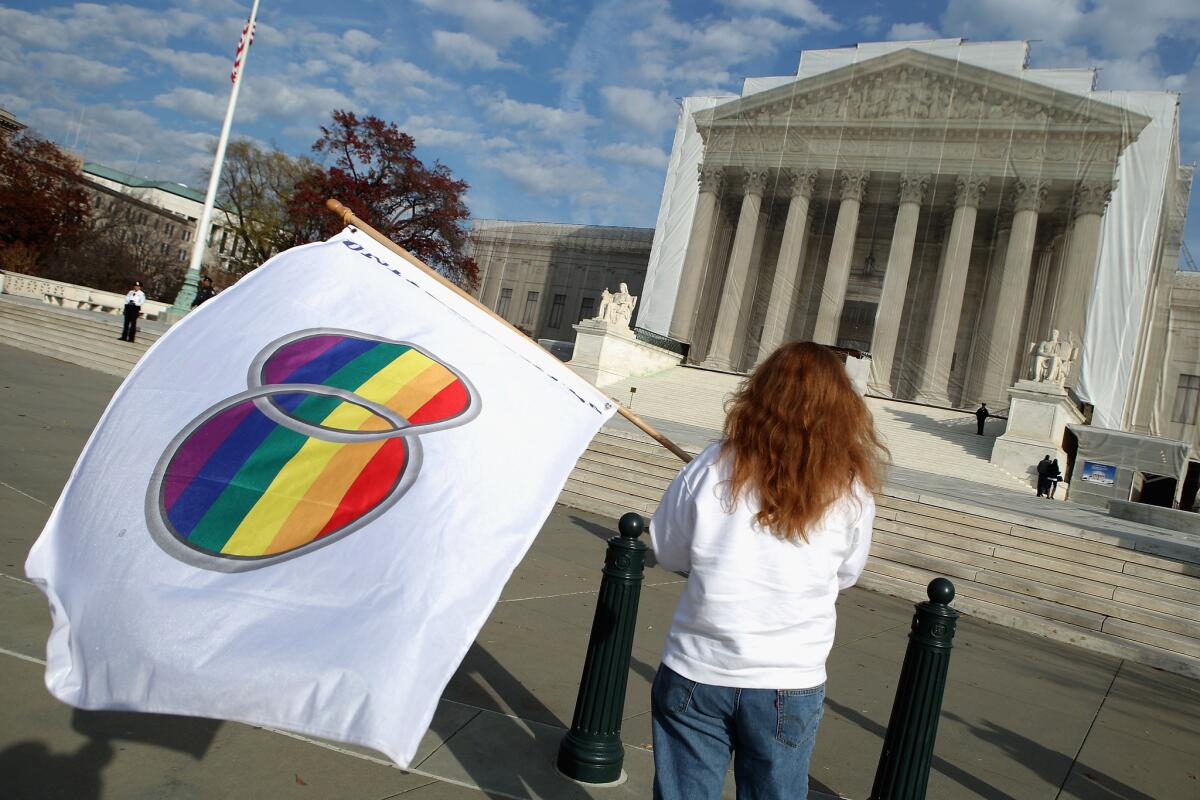A third possibility on Prop. 8

After the Supreme Court hears oral arguments in the case of Hollingsworth vs. Perry later this month, justices could decide that Proposition 8 — which bans same-sex marriage in California — is legal. Or they could declare the measure unconstitutional under the equal protection clause.
But there is also a third possibility. Justices could dismiss the case on procedural grounds, which would have the effect of leaving in place a court ruling that allows gay marriage in the state.
The case before the Supreme Court involves a lawsuit filed in federal district court in San Francisco against the state officials responsible for enforcing Proposition 8. After hearing the case, Judge Vaughn R. Walker declared the law unconstitutional and issued an injunction against its enforcement. The defendants, including California’s governor and attorney general, chose not to appeal this ruling and were ready to allow gay marriages in the state without further legal skirmishes.
TIMELINE: Gay marriage chronology
At that point, however, supporters of the initiative sought to appeal the decision themselves. A divided panel of judges at the U.S. 9th Circuit Court of Appeals upheld Walker’s ruling. But they gave the initiative’s backers one victory, ruling that they had legal standing to file an appeal in the case after the state decided not to.
Many legal scholars question that part of the ruling, wondering how the proponents of Proposition 8, who suffered no injury as a result of the initiative being invalidated, had standing to pursue the action. Prior Supreme Court cases have held that the authority to defend a law rests solely with the state, and in this case California officials had elected not to fight the ruling.
Many of the briefs filed so far in the case focus on the constitutionality issue. But in granting review, the Supreme Court also asked for briefing and oral argument on the procedural question of whether supporters of the initiative have standing to appeal a court decision if state officials choose not to do so. In their oral arguments in late March, both sides will address that issue.
This raises the possibility that the court won’t resolve the constitutionality issues of Proposition 8 at all, but will instead dismiss the case on the grounds that only the losing party in a lawsuit can appeal an adverse decision. If that were to happen, Walker’s decision and order would remain untouched.
What would that mean? The district court’s injunction commands the governor, the attorney general, the state registrar and “all persons under the control or supervision of defendants” to cease application or enforcement of Proposition 8. It therefore requires the state registrar to amend the state’s marriage license forms and to distribute them to all counties and county clerks, and — together with the governor and attorney general — to ensure that those local officials under the registrar’s supervision allow same-sex couples to marry.
In their brief to the Supreme Court, the proponents of Proposition 8 nevertheless contend that, in the event they are deemed to be without standing, the district court “lacked remedial jurisdiction to award any relief beyond a default judgment limited to the four named plaintiffs.” In other words, they contend that Walker’s ruling should apply only to the four people who brought the case.
But this is simply wrong. In fact, the plaintiffs sought — and obtained — a declaratory judgment that Proposition 8 is unconstitutional on its face. Whether affirmed on its merits by the Supreme Court or not, Walker’s declaratory judgment declared Proposition 8 invalid throughout the state.
Ideally, the court will rule that gays and lesbians have the same right to marry as heterosexual couples. But if instead it dismisses the case on the narrower issue of standing, that will nevertheless be a major victory for civil rights in California.
Erwin Chemerinsky is dean and professor of law at the UC Irvine School of Law.
More to Read
A cure for the common opinion
Get thought-provoking perspectives with our weekly newsletter.
You may occasionally receive promotional content from the Los Angeles Times.






